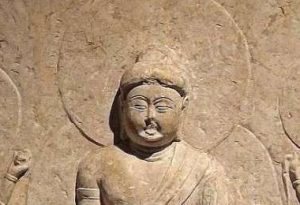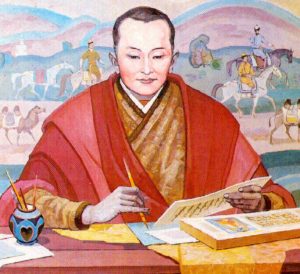
Faith is one of the five roots of virtue
When we talk about the five roots of virtue in Buddhism, most of us think of the root of wisdom. However, faith is also a root of virtue, and the first of the five: faith (Skt. shraddha), zeal, mindfulness, meditation (Skt. dhyana), and wisdom (Skt. prajna). It should be noted that faith, which is different from “belief,” is developed and supported through the other four roots of virtue.
The Avatamsaka Sutra says: “Faith is the source and origin of all merit and virtue; it is like an embryo from which all the various roots of virtue grow.” Although faith is the first root of virtue, all five are interrelated and interdependent. In other words, both faith and wisdom are roots of virtue and their nature is basically the same. Generally, faith comes from the zealous cultivation of mindfulness (invocation), while wisdom comes from the zealous cultivation of meditation.
Instead of establishing and developing the root of wisdom, Pure Land practitioners are encouraged to establish the root of faith, which is developed through invocation or mindfulness of the Buddhas, particularly Amitabha Buddha (which accounts for the practice of Amitabha-recitation). Their root of faith will thereby be nourished and nurtured, and will eventually grow deeper.
“Faith through devotion” established in the context of the Buddhas
How is the “Deep” Mind, or deep faith in Amitabha Buddha and his teachings of deliverance, obtained? In the explication of the Deep Mind in the Commentary on the Contemplation Sutra, Master Shandao indicates there are two ways to obtain faith, or specifically “faith through devotion.” The first is in the context of persons (Buddhas), and the second, in the context of practice (Amitabha-invocation).
The statement that iniquitous ordinary beings will be reborn in the Pure Land by reciting Amitabha’s name is not made by a person but by Shakyamuni, the supremely enlightened and exceedingly compassionate one. And Shakyamuni is not the only Buddha who says so; the teaching is propagated, extolled, and corroborated by all the Buddhas in the six directions, as described in the Amitabha Sutra. Because this is a teaching by all the Buddhas, it cannot be obstructed by anything anyone says. It can instill in our minds an unwavering faith.
When Master Shandao introduces the concept of establishing faith in the context of persons, he says: “I sincerely advise all those who have the karmic conditions to aspire to rebirth [in the Land of Bliss] to deeply believe in the Buddha’s words alone, and to concentrate on strictly following his instructions. Do not accept or follow another bodhisattva’s teachings, as they are incompatible [with the teachings on Amitabha’s Pure Land]. Such learning may create obstacles for those practitioners with doubts, lead them into a maze of confusion, and eventually cause them to lose the great benefit of rebirth [in the Land of Bliss].”
Faith through devotion established in the context of practice
In his explication of the Deep Mind, Master Shandao identifies the Five Primary Practices of Amitabha-invocation. They are: reading the Pure Land sutras, contemplating the Buddha, prostrating before the Buddha, reciting the Buddha’s name, and offering praises and making other offerings before the Buddha. It is interesting to note that Master Shandao adds the phrase “single-minded and exclusive” before the description of each of the Primary Practices.
“Single-minded exclusivity” is the essential criterion for the Pure Land practitioner in these Primary Practices for establishing faith in Amitabha’s deliverance. Hence, a Pure Land practitioner must maintain an attitude of “single-minded exclusivity” in the practice of Amitabha-recitation. This attitude is regarded as “zealous cultivation” in Pure Land Buddhism. Here, we should pause to note that “zealous cultivation” is often misunderstood as referring to the number of recitations of Amitabha’s name accomplished (quantity) or to the degree of concentration achieved during recitation (quality).
As stated by Master Shandao, the Primary Practice of Amitabha-recitation is “the karma (action) of assurance of rebirth [in the Land of Bliss],” being the only practice cited in Amitabha Buddha’s Fundamental Vow. By reciting the name of Amitabha exclusively, we are assured of rebirth in the Pure Land by the power of his Fundamental Vow. It is, in fact, the ultimate practice, and dispels all doubts.
Faith through interpretation
Traditionally, many Buddhists like to pursue wisdom through the zealous practice of meditation, thus cultivating the root of wisdom. This involves a progression from belief, to interpretation, to practice, and finally to realization. Belief, which is the first step in this process, is the personal acceptance of the Buddhist teachings as being true.
When one hears the Buddhist teachings, one should consider whether they are sensible and reasonable before accepting them. Some followers then pursue a rational approach to Buddhist study and develop faith based on their own understanding of the teachings. This is known as “faith through interpretation,” and can result in enlightenment or wisdom similar to that achieved through the zealous cultivation of meditative virtue.
However, if one digs deeper and tests what one believes through practice with due diligence, mindfulness, and concentration (meditation), one may eventually realize that one’s beliefs are true. Realization of the truth is a kind of wisdom or enlightenment that can benefit oneself by benefiting others. This is also known as “faith through interpretation.”
With the arising of faith, one’s belief in the Buddhist teachings grows stronger and some doubts are dispelled through interpretation or meditative practices. At this stage, faith takes root at a deeper level in the heart of an individual. It is direct and personal, and can be the wellspring of mystical experience. Thus, faith can be regarded as the emotional and experiential side of belief. Without faith, belief is weak and flimsy, and vulnerable to the vagaries of false interpretation and non-Buddhist teachings.
Deep roots of virtue, inherited from past lives, are required in Pure Land Buddhism
In reference to the Great Sutra, Master Shandao states: “If a person deeply believes when he hears the Pure Land teachings in this life, he must possess deep roots of virtue accumulated in zealous cultivation in his past lives.” Although wisdom is considered the primary root of virtue, the root of faith is generally considered essential in order to pass through the entrance to the Pure Land.











